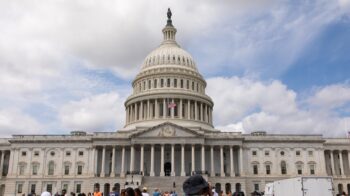
Rep. Randy Forbes
WASHINGTON: This afternoon, a congressionally chartered panel of prestigious defense experts denounced sequestration as “self-defeating” and a “serious strategic misstep” that “Congress and the President should repeal…immediately.” But will it preach to anyone not already in the choir?
While bipartisan, the National Defense Panel is most heeded by House Republicans. They see it as a valuable alternative to the Obama administration’s Quadrennial Defense Reviews, which House Armed Services Chairman Buck McKeon in particular considers so inadequate as to violate the law. (There were NDPs under Clinton as well, but not during the Bush years). Both the 2010 NDP and this one call for more defense spending in general and a stronger Navy in particular. No wonder, then, McKeon hailed its release and that Republican Rep. Randy Forbes – the House seapower subcommittee chairman and an arch-foe of sequestration – called me this morning to tout the report.
“I don’t know of anywhere where you bring together such a diversity of talent and expertise as you do on this independent panel to review the QDR,” Forbes told me, “You don’t get more [bipartisan] than this panel, [and] I certainly think it gives us a lot of support for positions that we have been advocating.”
What do Democrats think? “Given that they’re endorsing some things most of the Armed Services Committee already agrees with, e.g. repealing sequestration… you’ll see the NDP being whipped out and used as a rhetorical support,” predicted one House Democratic aide. “It will be used by people who already believe in the message — and everyone else will ignore it.”
“It’ll be required reading for people already interested in defense, but I’ll be surprised if it changes anybody’s position in any way,” agreed Maren Leed. Now a senior advisor at the Center for Strategic and International Studies, Leed worked for Democratic Senator Carl Levin (now SASC chairman) before serving in the Pentagon under both Bush and Obama as a non-political appointee. The 2010 NDP “put some recommendations on the table that were pretty large departures from where the Department was,” she recalled. “They were ignored.”
“The chief proponents of the NDP the whole way along definitely have been HASC Republicans; I don’t think it’s been particularly of interest to anyone in the SASC,” said Sam Brannen, a former Obama official also now at CSIS. Nevertheless, “the NDP can say things that are both inconvenient for the administration and inconvenient for congress,” Brannen went on. “It can blow the alarm on things like the actual cost to our national security of the collapse of consensus on defense spending [and] frame some of these grand strategic questions that are now contributing to gridlock inside the armed services committees.”
But even within the House GOP, Leed said skeptically, “some House Republicans will think it’s great. Other House Republicans who are more focused on the debt will say, of course that’s what you get when you ask a bunch of retired generals.”
Of the NDP’s 10 current members, five are in fact retired generals: three Army, one Marine, one Air Force. Two panelists are former top Pentagon officials (both Democrats), two are former Armed Services members (one from each party), and one is a retired ambassador. Interestingly, the panel includes no admirals, yet it departs from service parochialism sufficiently to insist that the Navy needs a larger share of the defense budget, along with the Air Force, while the Army and Marines should simply not be cut below their pre-9/11 strength. Overall, the NDP says, the force should approach the old standard (arguably never reached in practice) of being able to fight and win two wars simultaneously.
There’s no way to do any of this under sequestration-level budgets, which the panel calls “unacceptable.” Escalating Russian and Chinese aggression, North Korean and Iranian nuclear programs, and sectarian civil war in Syria and Iraq “are among the trends that mandate increased defense funding,” the report declares (emphasis mine).
It’s important that the bipartisan panel agreed there’s a widening gap between global threats and US capabilities to combat them, Forbes told me. “They acknowledge that even if we put the resources there, we may not be able to stop that,” he said, “but if we don’t put the resources there, we don’t stand a chance of stopping that.”
“I think it does have impact, Sydney,” Forbes said, “and here’s where: [It] points out in this review is that the problems that sequestration brings to national defense dwarf any problems that sequestration may bring to other aspects of the budget. And therefore if you can’t get rid of sequestration across the board for everything, you sure by golly better get rid of it as relates to defense.”
Given Democrats’ insistence that any deal to spare defense from sequestration should protect domestic spending as well, there’s hardly a bipartisan consensus on that point, I noted.
“There is not,” Forbes replied, “but sometimes what you have to do is first of all define the problem so you can get consensus.”
“It’s going to be important that we get these findings out [and] do a good job educating our colleagues so we begin to shift this debate,” the congressman continued. “I see that movement taking place, I see it taking place within our conference already, [and] this report will go a long ways to help.”
Senate passes $95 billion foreign aid bill, as DoD eyes next Ukraine weapons package
Additional aid for Ukraine could be made available “within days” said Pentagon Press Secretary Maj. Gen. Pat Ryder earlier today.

























